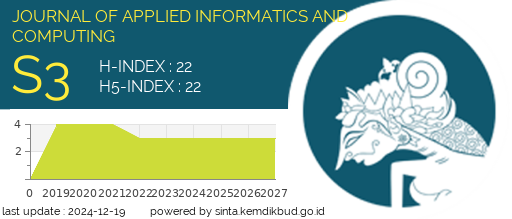Pengembangan Aplikasi Listening Test Berbasis Android
DOI:
https://doi.org/10.30871/jaic.v3i2.1181Keywords:
Android, Development, Listening Test, Mobile ApplicationAbstract
Listening is one of the skills that must be possessed by learners who learn a language. Listening becomes very important skill because it supports other skills that is speaking. The skills must always be trained to improve. Listening courses are currently done by manual, which students answer on a piece of paper and lecturers check the test result manually. The research used Research and Development method. The output of research is an application that is still in the form of prototype. With this application, lecturers more easily in organizing listening test questions and facilitate scoring test results. From the results of the validation of media experts and material experts, 68.75% were obtained. From these results, the application still needs revisions. From the results of testing to students, the results obtained 92% and can be categorized into valid criteria. Research can be continued to test its use while on learning process so that it can be used as teaching material that is suitable for use in the listening courses in the following semester.
Downloads
References
S. Flohr and P. Paesler, Teaching Speaking and Listening. Germany: GRIN Verlag, 2010.
K. S. Kitao and K. Kitao, "Testing Listening," Internet TESL J., vol. II, no. 7, 1996.
H. D. Brown, Language assessment : principles and classroom practices. San Francisco: Longman, 2004.
I. K. Yusri, R. Goodwin, and C. Mooney, "Teachers and Mobile Learning Perception: Towards a Conceptual Model of Mobile Learning for Training," Procedia - Soc. Behav. Sci., vol. 176, pp. 425"“430, 2015.
D. E. Kurniawan, A. Dzikri, H. Widyastuti, E. Sembiring, and R. T. Manurung, 'Smart mathematics: a kindergarten student learning media based on the drill and practice model', J. Phys. Conf. Ser., vol. 1175, p. 12037, Mar. 2019.
N. Z. Janah, Y. Rokhayati, D. E. Kurniawan, and M. F. Muvariz, 'Electronic School Books Dissemination Application for Batam Hinterland Schools', Adv. Sci. Lett., vol. 24, no. 12, pp. 9739"“9744, 2018.
D. E. Kurniawan and R. Simon, 'Aplikasi Kamus Aneka Bahasa Daerah Berbasis Smartphone Android', in Seminar NasionalTeknologiInformasi, KomunikasidanIndustri (SNTIKI), 2013, vol. 5.
C. O'Malley, G. Vavoula, J. Glew, J. Taylor, M. Sharples, P. Lefrere, P. Lonsdale, L. Naismith, and J. Waycott, "Guidelines for learning/teaching/tutoring in a mobile environment," hal-00696244, 2005. [Online]. Available: http://www.mobilearn.org/.
"Mobile Learning," The University of Sydney, 2018. [Online]. Available: http://sydney.edu.au/education_social_work/learning_teaching/ict/theory/mobile_learning.shtml. [Accessed: 20-Mar-2018].
Google Developers, "Android Studio." [Online]. Available: https://developer.android.com/studio/intro. [Accessed: 22-Mar-2018].
B. Alfian, "Pengembangan Aplikasi Tes Listening Di SMA Takhassus Al Qur ' an Demak ( IPTEK ) adalah suatu hal yang sangat dengan tidak adanya IPTEK pekerjaan manusia akan sulit terselesaikan dengan efektif . Saat ini banyak berkembang berbagai macam ilmu pengetahuan ," vol. 4, no. 2, pp. 13"“19, 2017.
F. Teknik and U. N. Semarang, "Pengembangan Aplikasi Android Untuk Mendukung Pembelajaran Listening Bahasa Inggris Kelas XI SMA Galuh Puspita Ariputri , Eko Supraptono , Teguh Suradi Jurusan teknik Elektro , Fakultas Teknik , Universitas Negeri Semarang," vol. 16, no. 4, pp. 48"“56, 2015.
F. A. Putri and N. S. Harahap, "Rancang Bangun Aplikasi Pembelajaran Bahasa Inggris Pada Platform Android (Studi Kasus : Sekolah Menangah Atas)," J. CoreIT J. Has. Penelit. Ilmu Komput. dan Teknol. Inf., vol. 3, no. 1, p. 41, 2018.
S. H Nazruddin and F. A. Putri, "Smart-Learning Bahasa Inggris Pada Platform Android," J. CoreIT, vol. 1, no. 2, pp. 37"“43, 2015.
R. F. Kemala, I. F. Astuti, and S. Maharani, "Penerapan Metode Fuzzy C-Means Pada Aplikasi Simulasi TOEFL (Test Of English As A Foreign Language) Berbasis Web (Studi Kasus: Fakultas MIPA Universitas Mulawarman)," Inform. Mulawarman J. Ilm. Ilmu Komput., vol. 14, no. 1, p. 17, 2019.
Y. F. Chandra, N. Dwiyani, and Y. Huda, "Perancangan Aplikasi Mobile Learning Test of English for International Communication (TOEIC) Simulation Pada Smartphone Berbasis Android," Vokasional Tek. Elektron. Inform., vol. 4, no. 2, pp. 26"“37, 2016.
D. Nurlaelasari, S. D. Budiwati, and Y. Yuningsih, "Aplikasi Simulasi Dan Pembelajaran Toefl Berbasis Android," Appl. Sci., vol. 2, no. 1, pp. 167"“175, 2016.
S. Aisa and E. Hasmin, "Perancangan Aplikasi Simulasi Toefl Berbasis Android," Konf. Nas. Sist. Inform., pp. 119"“124, 2015.
Y. Y. Marbun, R. R. Isnanto, K. T. Martono, P. Studi, S. Komputer, F. Teknik, U. Diponegoro, and B. Box, "Pembuatan Aplikasi Toefl Sebagai Media Pelatihan Bahasa," vol. 4, no. 1, pp. 83"“92, 2016.
Y. D. Nuri David Maria Veronika, "Berbasis Komputer," J. Pseudocode, Vol. II Nomor 2, Sept. 2015, ISSN 2355 "“ 5920 Ranc., vol. 4, no. 1, pp. 1"“5, 2015.
Guntoro, "30 Menit Membuat Login Android Dengan SQLite Database," 2018. [Online]. Available: https://badoystudio.com/membuat-login-android-dengan-sqlite-database/. [Accessed: 20-Jul-2018].
Hanif Abdullah, "Tutorial membuat Aplikasi Kuis menggunakan Array," 2017. [Online]. Available: https://medium.com/@hanifabdullah7/kuis-array-fcd57418a0fe. [Accessed: 30-Jul-2018].
Sugiyono, Metode Penelitian Pendidikan (Pendekatan Kuantitatif, Kualitatif, dan R & D). Bandung: Alfabeta, 2010.
S. Arikunto, Prosedur Penelitian: Suatu Pendekatan Praktek, Edisi Revi. Jakarta: PT Rineka Cipta, 1996.
Sudaryono, Metodologi Riset di Bidang TI (Panduan Praktis, Teori dan Contoh Kasus). Yogyakarta: Andi, 2015.
Downloads
Published
How to Cite
Issue
Section
License
Authors who publish with this journal agree to the following terms:
- Authors retain copyright and grant the journal right of first publication with the work simultaneously licensed under a Creative Commons Attribution License (Attribution-ShareAlike 4.0 International (CC BY-SA 4.0) ) that allows others to share the work with an acknowledgement of the work's authorship and initial publication in this journal.
- Authors are able to enter into separate, additional contractual arrangements for the non-exclusive distribution of the journal's published version of the work (e.g., post it to an institutional repository or publish it in a book), with an acknowledgement of its initial publication in this journal.
- Authors are permitted and encouraged to post their work online (e.g., in institutional repositories or on their website) prior to and during the submission process, as it can lead to productive exchanges, as well as earlier and greater citation of published work (See The Effect of Open Access).











